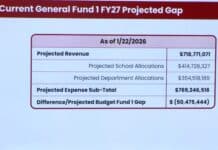For the second year in a row, a majority of Minnesota students aren’t proficient in reading or math.
Results from the 2024 Minnesota Comprehensive Assessment (MCA) released Thursday show 45.3% of tested students are proficient in math and 49.7% in reading. As the Minnesota Department of Education notes, “students who took the MCA in 2024 scored about the same percent proficient as last year.”
The Minnesota House Republican Caucus said math and reading scores have declined by 17% and 16%, respectively, during Gov. Tim Walz’s time in office.
Another dismal MCA test score report from @GovTimWalz’s education department — an astonishing 53.5% of Minnesota 3rd Graders are not reading at grade level.
Since @GovTimWalz took office:
Math scores 🔻17%
Reading scores 🔻16%
Science scores🔻23%— MN House Republicans (@mnhousegop) August 29, 2024
“Academic achievement challenges have existed pre-COVID, with declines exacerbated during school closures and interrupted learning,” Center of the American Experiment education policy fellow Catrin Wigfall said in an article analyzing the results.
During the 2023 legislative session, state Democrats increased education spending by $2.2 billion, bringing the total education budget to $23.2 billion.
State Sen. Julia Coleman, the Republican lead on the Education Policy Committee, called the new test scores a “warning to every parent that our kids are not getting what they need in the classroom.”
“Despite record increases in funding and better attendance, testing scores are stuck. Minnesota fourth grade reading skills now rank lower than Mississippi. Governor Walz and Legislative Democrats have not given teachers and schools the flexibility and accountability they need to get our kids back on track,” she said.
MDE said investments from the 2023 legislative session are “currently being implemented.” This includes “the largest funding increase for K-12 education in state history; additional teacher recruitment tools; COMPASS, a statewide system of support for continuous improvement; and the Minnesota Reading to Ensure Academic Development (READ) Act, which will overhaul reading education in the state.”
Coleman observed that these new investments come with “dozens of new mandates and controversial policies.”
“Despite Walz’s promise to ‘fully fund’ schools, the spending spree in St. Paul left schools across the state managing deficits for the current school year,” she said.
Despite the low test scores, MDE said chronic absenteeism is on the decline. Statewide consistent attendance rose to 74.5% of students attending at least 90% of the time in 2023, up from 69.8% in 2022.











